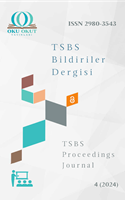Mâtürîdî’nin İnanç Temalı Kıssalara Yaklaşımı: Hz. Mûsâ – Salih Kul Kıssası
Māturīdī’s Approach to the Faith-Themed Stories: The Narrative of Prophet Mūsā - The Pious Servant
Author(s): Mücahit KılınçSubject(s): History of Islam, Sociology of Religion, History of Religion, Qur’anic studies
Published by: Oku Okut Yayınları
Keywords: Kalām; Māturīdism; Qissa; Prophet Mūsā; Prophet Mūsā - The Pious Servant;
Summary/Abstract: In this study, it is discussed how Māturīdī understood and interpreted the story of Prophet Mūsā and the Pious Servant from a theological point of view in his commentary called Ta’wīlāt al-Qur’ān. The study aimed to analyze the parable of Prophet Mūsā and the Pious Servant according to Māturīdī by focusing on the attributes of will and power, especially the attribute of knowledge of Allāh. Content analysis method, one of the qualitative research techniques, was used in the study. As a result of the research, it has been determined that the parable of Prophet Mūsā and the Pious Servant contains many theological issues and Māturīdī expressed his own views on this occasion. In the parable of Prophet Mūsā - the Pious Servant, Māturīdī tries to determine the messages contained in the story on the one hand, and on the other hand, he makes inferences that are compatible with his own kalām system. In the parable of Prophet Mūsā - the Pious Servant, Māturīdī emphasized the absolute, limitless knowledge of Allāh. He did not consider the parable on the basis of nubuwwat-walāyat, as in Sufism, and evaluated the information that came to the Pious Servant within the scope of revelation. He did not make a clear statement about the Pious Servant’s religious identity. He emphasized his quality of being a servant and his acting with the revelation. According to him, the Pious Servant did not kill the child spontaneously, but by Allāh’s command. Therefore, this issue should not be overlooked. He rejected the principle of absolute submission of the Sufis in connection with the understanding of reason-based morality. Based on the dialogue between Prophet Mūsā and the Pious Servant before they set out on the journey to-gether, he made a few evaluations about the use of the word inshāllāh. It is as if he gave the message that our words and deeds should reflect our faith with this approach. In addition, he made theological inferences about the ability to act from the parable. * This study is based on the master’s thesis titled “Māturīdī’s Interpretation of Parables and His Approach to Parables about Faith” prepared under the supervision of Dr. Abdullah Demir.
Journal: TSBS Bildiriler Dergisi
- Issue Year: 2024
- Issue No: 4
- Page Range: 1-16
- Page Count: 16
- Language: Turkish

